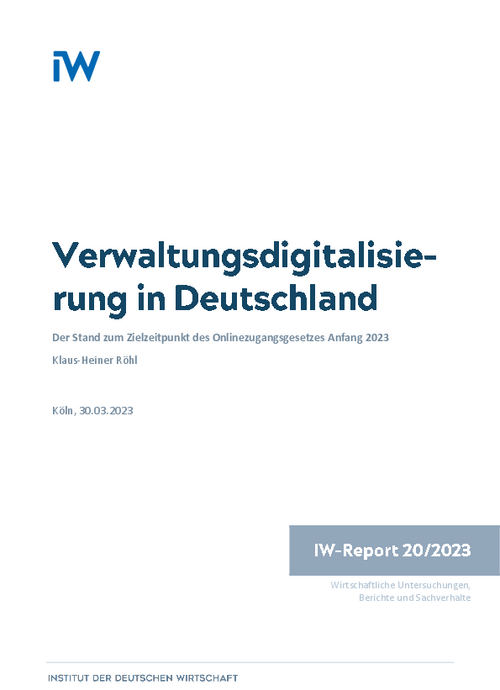The digitization of public administration is making almost no progress in Germany. In a European comparison, the country continues to rank in the lower midfield in terms of e-government.

Administrative digitization in Germany: The status at the target date of the Online Access Act at the beginning of 2023

The digitization of public administration is making almost no progress in Germany. In a European comparison, the country continues to rank in the lower midfield in terms of e-government.
In the EU's implementation status for digital public services, Germany ranked only 18th out of 27 member states in 2022. The Online Access Act (Onlinezugangsgesetz, OZG) was supposed to ensure the widespread implementation of digital services for citizens and companies by the end of 2022, but only 105 of the 575 services listed in the Act were implemented on time. And here, too, implementation remained piecemeal in some cases: Politicians and administrators concentrate on creating online forms for users but neglect the end-to-end digitization from front desk to back office. Priorities are now to be defined for the further implementation of the OZG, but the disciplining effect of a new deadline and uniform nationwide approaches are not envisioned. However, the advantages of digital solutions cannot be leveraged without a uniform, comprehensive digitization of internal administrative processes throughout Germany. So far, processes remain oriented to previous paper-based administrative procedures and in some cases increase personnel intensity instead of using digital options like platforms to increase productivity. There is no danger that productivity-enhancing digitization will lead to lay-offs in German public administration – on the contrary, without exploiting the potential of automated AI-based cloud solutions, for example, it will be impossible to cope with the demographically induced staff shortage caused by a lack of young applicants. This development threatens to cause a further decline in the quality and speed of public administrative services.

Administrative digitization in Germany: The status at the target date of the Online Access Act at the beginning of 2023

More on the topic

Digital Learning Media Boost Continuing Vocational Training in Enterprises
Digitalisation is leading to an increasing need for training. Companies which have already achieved a higher level of digitalisation see a greater need for further training than their less digitalised peers and are investing correspondingly more time and money ...
IW
The Digital Economy in Germany
For many years now an OECD working group has been developing and coordinating an internationally comparable quantification of the economic effects of digitalization. However, the practical value of this initiative is limited by the nature of the available ...
IW